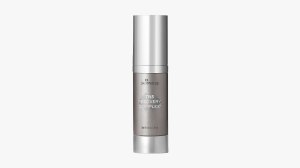In luxury skincare, innovation often takes the form of hyper-targeted actives, regenerative ingredients, and futuristic formulations. But few technologies have stirred the high-end grooming world quite like exosomes.
Proponents claim these microscopic vesicles can teach the skin to repair itself; some believe that widespread adoption will redefine the way we age. Once confined to scientific research in regenerative medicine, exosomes are now making their way into serums and post-procedure skin treatments, offering a glimpse at what could be the next major leap in cosmetic science. But what exactly are they, and can they live up to the hype?
What are exosomes?
To understand the appeal of exosomes, it helps to start with understanding biology. These nanoscale bubbles serve a fundamental purpose: carrying genetic material and proteins from one cell to another, facilitating communication at the cellular level. “Exosomes are vesicles produced by the body that have a membrane and are secreted by various cells,” explains Anay Kacharia, senior chemist at iLABS, the New Jersey research facility behind a variety of recognizable skincare and haircare companies. “Think of them as extremely small bubbles that can carry proteins, lipids, growth factors, and nucleic acids. These exosomes have an impact on cell-to-cell communication by binding to receptors to influence cell behavior.”
That cell-to-cell contact is crucial. By delivering biologically active compounds directly to where they’re needed, exosomes provide a highly targeted approach to skin repair and renewal, making them especially appealing for high-performance luxury skincare formulations. “Because they have an impact on changing the outcome of cell behavior, exosomes are becoming very popular in prestige skincare,” Kacharia adds. “They can impact the inflammation response of the skin, regulate cell maturation, and also affect acne development cycles.”
How do exosomes benefit the skin?
While peptides, retinoids, and growth factors have long been the stars of anti-aging formulations, exosomes bring something different to the table: a delivery mechanism. Rather than acting as a single ingredient, they serve as a vessel, one that can carry a range of actives with more precision.
“Exosomes are not just actives; it would be more appropriate, in my opinion, to consider them as carriers of actives,” says Kacharia. “Depending on the source of extraction—stem cells, plant cells, platelets—the effectiveness is dependent on the purity and the method of extraction.”
Dr. Dendy Engelman, a board-certified cosmetic dermatologist and Mohs surgeon at the Shafer Clinic in New York City, has seen firsthand how exosomes behave in the context of skin repair and aging. In her experience with patients who regularly use exosomes, many show brighter skin, more even skin tone, smoother texture, and plumper and firmer skin over time. And, in many cases, red marks and fine lines fade. “Overall, skin tends to look healthier, more resilient and revitalized, with results that build gradually over several weeks,” she reports.
It’s also worth noting that the source of exosomes may be just as important as their intended benefit. Whether derived from human stem cells, plants, or even blood platelets, the efficacy of any exosome-powered product hinges on its origin and formulation quality. “You could technically target any number of benefits through exosomes, depending on where you source them from,” Kacharia explains.
In clinical settings, dermatologists are increasingly incorporating exosomes into post-treatment protocols, too. After microneedling or chemical peels, for example, exosomes may be applied to soothe inflammation and accelerate recovery. Dr. Connie Yang, a board-certified dermatologist and Dermstore Medical Advisory Board member, agrees that they have potential, but is cautious against premature comparisons to well-established ingredients. “While the data is promising, we still need more research to support the efficacy of exosomes,” she says. “We are lacking large-scale clinical trials, thus the data is not as robust for exosomes as it is for retinoids, which have decades of data to support their efficacy and results,” says Yang.
A peer-reviewed study published in Cosmetics (MDPI) in January found that topical application of exosome serums led to statistically significant increases in skin hydration and barrier integrity within just two to four weeks of use. However, it also noted limitations, such as small sample sizes and inconsistent product standardization across formulations.
What should I look for in an exosome serum?
Exosomes may not replace your retinol just yet, but they could enhance its effects or offer an alternative for those who can’t tolerate harsh actives. But for consumers, separating hype from science requires diligence. “[Selecting an exosome] can be tricky because exosomes are not tightly regulated by the FDA or other global health authorities,” notes Dr. Yang. “The quality, sourcing, and efficacy can vary widely. When choosing, look for a clearly stated origin of the exosomes (human stem cells, plant-derived, platelet-derived) and make sure it is clearly stated and not vague or undisclosed.”
It’s also important to look for the purifying and filtration process, and third-party testing for sterility, safety, and potency. Dr. Engelman stresses that not all exosome formulations are created equal. “Be wary of claims that exosomes can completely reverse aging or replace injectables, which simply isn’t realistic,” she says.
So, will exosomes earn a permanent place in the skincare lexicon—or are they another fleeting trend dressed in scientific jargon? “Exosomes are definitely an exciting innovation we’re seeing in skincare right now,” Engelman says. “While research is still growing, the results so far are impressive. I do believe that exosomes have the potential to become a long-term player in the future of skincare.”
The Best Exosome Serums You Can Get Right Now
-
SkinMedica TNS Recovery Complex
Image Credit: Skinmedica “This product specifically contains a high concentration of exosomes sourced from human fibroblasts,” says Dr. Yang. Fibroblasts are cells found in our connective tissue that promote the production of collagen, making this serum especially good for those who want to address fine lines and wrinkles.
-
Dr. Diamond’s Metacine Instafacial Plasma
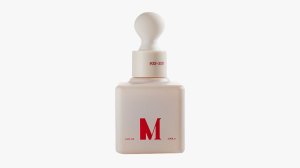
Image Credit: Dr. Diamond’s Dr. Diamond’s Metacine Instafacial Plasma distills his signature in-office treatment into a high-performance serum powered by exosomes, growth factors, and peptides. Designed to boost collagen and accelerate cellular renewal, it delivers clinical-grade results in a luxury at-home format.
-
Augustinus Bader The Elixir
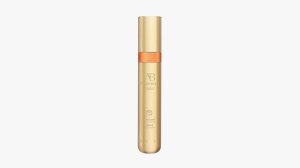
Image Credit: Augustinus Bader “I love all of the Augustinus Bader products formulated with their patented TFC8, but the elixir contains plant-derived exosomes to amplify results for skin tone, texture, and elasticity,” says Dr. Yang.
-
Plated Skin Science Daily Serum
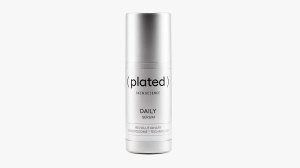
Image Credit: Plated Skin Science “It delivers powerful bioactive support (exosomes + growth factors) but with minimal irritation, making it a great option for daily use,” says Dr. Engelman. “I also love that it’s formulated with a hydrating blend of glycerin, arginine, and silanetriol.”
-
Dr. Barbara Sturm Exoso-Metic Eye Serum
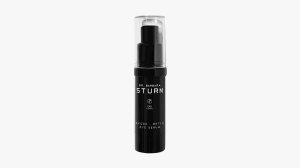
Image Credit: Dr. Barbara Sturm Powered by a proprietary complex that supports regeneration and hydration, this elegant serum is designed to deliver a visibly smoother, more resilient eye contour with each use.
-
FactorFive Regenerative Serum
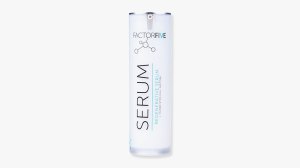
Image Credit: FactorFive “I love that this serum is lightweight and absorbs quickly, making it easy to incorporate into any routine without heaviness,” says Dr. Engelman. “It provides targeted regenerative support to boost collagen and soothe redness.”
-
Medik8 C-Tetra Advanced Gel Serum
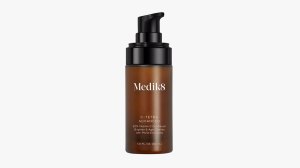
Image Credit: Medik8 “Medik8 recently launched a phyto exosome gel-serum, which is an excellent vegan option,” says Dr. Engelman. “In addition to plant-derived exosomes, the formula contains vitamin C, multi-weight hyaluronic acid, and the antioxidant acetyl zingerone. It delivers hydration, brightens and smooths the skin, and helps reduce signs of aging, with clinically-backed results.”
-
AnteAGE MD Serum & Accelerator
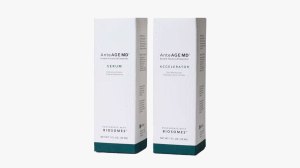
Image Credit: AnteAge MD “This two-step system uses bone marrow stem cell-derived growth factors, exosomes, and potent antioxidants to help stimulate collagen renewal,” says Dr. Engelman. “I love that it’s designed for both post-procedure recovery and daily anti-aging, giving skin a more resilient, even, and hydrated appearance over time. It’s ideal if you want to strengthen sensitive or compromised skin while still addressing aging concerns.” However, it’s only available through dermatologists’ offices, so make an appointment if you’re interested in trying it.
-
Medicube One Day Exosome Shot 7500 Serum
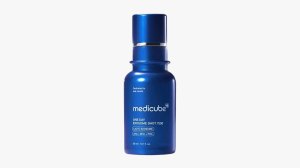
Image Credit: Medicube Medicube’s One Day Exosome Shot 7500 Serum is like a power boost for your face; it’s packed with 7,500 ppm of exosomes to recharge skin after late nights, long flights, or tough workouts.
-
The Inkey List Exosome Hydro-Glow Complex
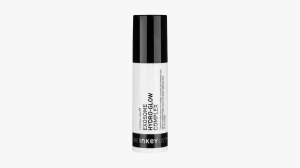
Image Credit: The Inkey List Don’t let the price fool you: This serum, formulated with hydrating and brightening ingredients, is a great way to start experiencing how exosomes can impact your skin. “I love that it’s lightweight, absorbs quickly, and is easy to layer,” says Dr. Engelman.
-
SickScience PowerCycle Scalp Treatment Serum
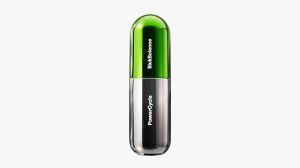
Image Credit: SickScience SickScience’s PowerCycle Scalp Treatment Serum is a high-performance formula powered by exosomes, biomimetic peptides, caffeine, and redensyl to energize the scalp and support fuller, thicker hair growth.

